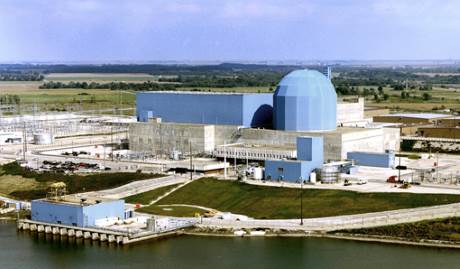Exelon announced today it will move forward with the early retirements of two nuclear power plants in Illinois - Clinton and Quad Cities - due to a lack of progress on the US state's energy policy.
 |
| Clinton (Image: Exelon) |
Last month, Exelon warned it would move forward with the early retirements of Clinton and Quad Cities if the state of Illinois fails to pass the Next Generation Energy Plan (NGEP), which would support their continued operation.
However, today it announced, "While the Illinois legislative session has not ended, the path forward for consideration of the NGEP legislation is not clear. As a result, Exelon has begun taking necessary steps to shut down the two plants."
The Clinton plant will close on 1 June 2017, with the Quad Cities plant following one year later, Exelon said. It noted Clinton - a single-unit 1065 MWe boiling water reactor (BWR) that began commercial operation in 1987 - and Quad Cities - comprising two 940 MWe BWRs that both began operating in 1973 - have made a combined loss of $800 million over the past seven years, despite being two of the utility's best-performing plants.
Exelon said it will submit permanent shutdown notifications to the US Nuclear Regulatory Commission within the next 30 days. It will also terminate capital investment projects required for the long-term operation of both plants. In addition, the company will cancel fuel purchases and outage planning for the plants. Exelon said it will immediately take one-time charges of $150 million to $200 million for 2016, and accelerate some $2 billion in depreciation and amortization through to the announced shutdown dates.
Exelon president and CEO Chris Crane said, "This is an extremely difficult day for the 1500 employees who operate these plants safely and reliably every day, and the communities that depend on them for support."
He added, "We have worked for several years to find a sustainable path forward in consultation with federal regulators, market operators, state policymakers, plant community leaders, labour and business leaders, as well as environmental groups and other stakeholders. Unfortunately, legislation was not passed, and now we are forced to retire the plants."
The utility said it will still work towards getting the NGEP passed by the Illinois legislature. "While these policy reforms may come too late to save some plants, Exelon is committed to working with policymakers and other stakeholders to advance an all-of-the-above plan that would promote zero-carbon energy, create and preserve clean-energy jobs, establish a more equitable utility rate structure and give customers more control over their bills."
If passed, the NGEP would make Illinois one of the first states to recognize the zero-carbon benefits of nuclear energy. It would also nearly double energy efficiency programs and boost the development of solar power in the state, growing it from less than 60 MWe to more than 1650 MWe by 2030.
Exelon noted that a state report had concluded closing the Clinton and Quad Cities plants would increase wholesale energy costs for the region by $439 million to $645 million annually. That report also said keeping the plants operating would avoid $10 billion in economic damages associated with higher carbon emissions over ten years.
In April, Exelon said it was committed to operate the Clinton plant until 31 May 2017 after clearing the annual capacity auction of the Midcontinent Independent System Operator regional transmission organization. Last month, Quad Cities - together with Exelon's Three Mile Island plant - failed to clear in the PJM Interconnection regional capacity auction for the 2019-2020 planning year, meaning those units will not be able to receive capacity revenue for that period.
The short-term nature of deregulated electricity markets have left other US nuclear power plants at risk of premature closure for economic reasons, despite their long-term future and their potential contribution to achieving greenhouse gas emissions targets. In April, Entergy announced that its Pilgrim plant in Massachusetts will close permanently in May 2019, while its FitzPatrick plant in New York State is to close in January 2017.
Researched and written
by World Nuclear News






_55401.png)
_23009.jpg)






